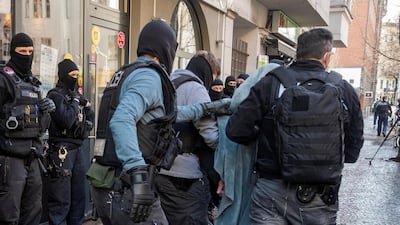A campaign by German politicians and police to eradicate clan crime is fuelling far-right violence by exaggerating the dangers posed by migrant populations, a lawyer said.
Berlin's gangland has been linked in German headlines to a series of spectacular crimes including a reputed €1 billion ($1.23bn) jewel heist and a bank robbery that ended in the branch being blown up.
But Erkan Zuenbuel said clan crime statistics were inflated by German authorities who lumped in minor offences committed by anyone with a notorious surname.
He said that armed police who raided shisha bars with machine guns had “created the impression that these are places fraught with crime”.
Last year, a far-right extremist killed 10 people after opening fire at two shisha lounges in the city of Hanau, one of a series of attacks that rattled Germany.
Mr Zuenbuel’s warning was part of a major report on the far right, published by Germany’s Heinrich Boell Foundation, which said that many extremist attacks on migrants were going unreported or unpunished.
According to the report, less than 10 per cent of far-right attacks on migrant accommodation led to successful prosecutions.
“When a place becomes the target of an attack, it’s always the result of a social discussion,” Mr Zuenbuel said.
In North Rhine-Westphalia, Germany’s most populous state, police brought in a zero tolerance strategy on organised crime and said more than 100 clans had operatives in the state, many of them from Lebanon.
Authorities in Berlin, meanwhile, adopted a “strategy of a thousand pinpricks” with a raft of measures to tackle the threat of clan crime.
Berlin targets Arab crime gangs
Berlin's Remmo family, one of Germany's most notorious crime gangs, is believed to be sheltering one of its own, a suspected gangster wanted for his alleged role in the 2019 jewel theft at Dresden's Green Vault.
The family is also linked to the theft of a giant gold coin, which was never recovered after it was stolen from a Berlin museum in 2017.
Berlin authorities said last year they had carried out 227 operations in 202 against so-called clan members, who have their roots in Lebanon and other Arab countries. During the sweeps 13 weapons, 76 cars, nearly 20,000 cigarettes and €38,000 ($45,526) were seized.
The city’s interior minister Andreas Geisel said in December that the forceful raids were needed to restore respect for the police.
“They used to be laughed out of the door. And when two trade inspectors wanted to inspect a bar, they would not be let in,” he said.
“Now, we come in on an appropriate scale, go inside, seize things and put organised crime under pressure.”
But Mr Zuenbuel said armed raids carried out at shisha bars often uncovered nothing more than administrative offences and regulatory breaches.
He said Berlin was creating an unfair picture of clan crime by collating offences by anyone with a suspect surname.
“Offences such as a minor theft by a young person are being included in these statistics,” he said.
“That leads to a picture being painted of an exceptional threat from clan crime, which doesn’t exist.”
Mr Zuenbuel said enterprises described as “family businesses” among Germans were quick to be labelled as “clan crime” among migrant groups.
A survey of offenders with stereotypically German surnames, such as Schmidt, Mueller or Maier, could just as easily lead to a perception of an organised crime clan, he said.
The report came after a series of far-right crimes in Germany, including last year's Hanau attack.
In January, German neo-Nazi Stephan Ernst was sentenced to life in prison for murdering pro-migration politician Walter Lubcke.
And in 2019, two people were killed after a neo-Nazi tried to enter a synagogue in Halle on the Jewish holiday of Yom Kippur.
Read more on Germany
Fast cars and hookah bars: On the trail of Berlin’s Arab gangsters
Gruppe S: 'Far-right conspirators' are charged with plotting attacks


